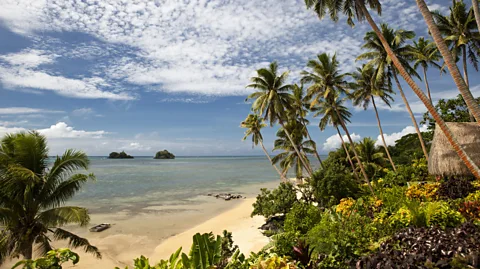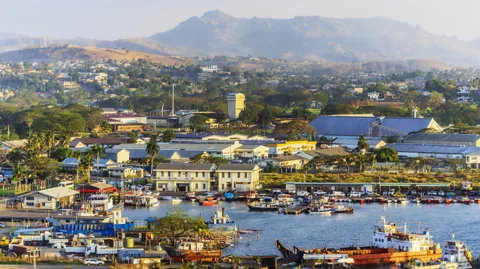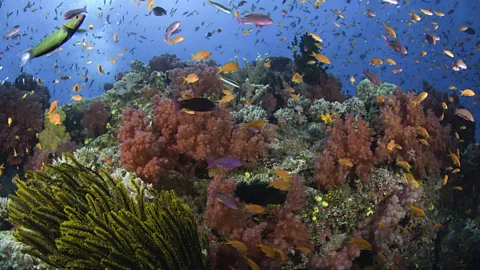The 333 islands opening to the world
 Michele Westmorland/Getty Images
Michele Westmorland/Getty ImagesAs of 1 December, Fiji instituted a quarantine-free travel policy to welcome vaccinated travellers from countries across the globe.
When the pandemic forced Fiji to close its borders in March 2020, the effect was immediately devastating to the island-nation's economy. In a country where the tourism industry accounts for 38% of GDP and employs more than 13% of the total population, the lockdowns meant layoffs, bankruptcies and permanent business closures.
"It was a rough and trying time for everyone," said resident Leba Digitaki, programme manager for Rustic Pathways. "The one thing that I am thankful for as a Fijian living in Fiji during the pandemic was the land and the sea. Our forefathers lived off the land and the sea sustainably for many years before the arrival and introduction of Western goods by foreigners."
By the time the second wave of virus cases hit the island, many residents had planted gardens, and villages and communities began to use barter systems, with platforms and groups on social media that helped people trade crops and seafood for goods from the shops like flour, sugar, rice and clothes.
Thankfully, the arrival of vaccines was a "game-changer", said Digitaki, as the country made it mandatory to be vaccinated to go to work, to travel or to enter shops and restaurants. Cases drastically diminished. "Over 91% of our eligible adult population, including tourism frontliners, are fully vaccinated against Covid-19," said Brent Hill, the CEO of Tourism Fiji. "It's an amazing feat for any destination."
 WestEnd61/Getty Images
WestEnd61/Getty ImagesWhy should I go now?
The huge success in vaccination has made it possible for the country to finally reopen its borders – after 20 long months. As of 1 December, Fiji instituted a quarantine-free travel policy to vaccinated travellers from its Travel Partner Countries, those with high vax rates and low infections.
Though the road ahead won't be easy, Digitaki and other residents are hopeful in routine returning to the islands, even if it looks a little different than before. "It's funny to say, but there is a sense of normalcy now with the wearing of masks, vaccination cards as a sort of ID and social distancing."
Travel with no trace
Despite producing less than 1% of the globe's carbon emissions, Fiji's 333 islands are some of the most threatened by rising global temperatures. The nation has been a consistent voice in the importance of tackling climate issues globally but has also focused on sustainability initiatives on its homefront, especially within its tourism industry.
Duavata, a sustainability collective, brings together tourism businesses that have a like-minded mission to create visitor offerings that preserve the environment and integrate cultural heritage and communities, while also providing mentorship to the next generation of sustainability leaders.
You may also be interested in:
• The island welcoming digital nomads
Visitors can also make informed decisions on where they stay on the islands. Digitaki recommends resorts that have either a marine biologist or environmental officer on staff or have a clear sustainability and environmental programme.
Namosi Eco Retreat is 100% Fijian owned and operated and gives visitors a chance to eat local food and sleep in traditional Fijian bures next to the Luva River – all without phones or electronics, as the retreat encourages a full digital detox. Oceanside, the Leleuvia Island Resort, located within the Lomaiviti group of islands, works to preserve its marine environment by coral planting and active monitoring of turtle nesting, whales and dolphins. The island's abundant wildlife can be spotted snorkelling, stand-up paddle boarding or atop a traditional outrigger canoe.
 Darryl Leniuk/Getty Images
Darryl Leniuk/Getty ImagesThe pandemic highlighted the continued importance of embracing local ingredients and sustainable ways of eating here. Kanu is one of the restaurants doing it best, said Digitaki. "The farm-to-table spot gives some of our local dishes a gourmet twist, and explains to the public the importance of reverting back to how our ancestors used to eat," she said. To see a local farm up close, Bulaccino Farm showcases native produce, sheep, ducks and chickens, as well as bees that produce medicinal honey for the farm's companion cafe, just 15 minutes away.
Know before you go
Regardless of vaccination status, visitors over 12 must provide a negative PCR test three days before departure. Upon arrival, travellers must install and activate the careFiji app, which provides countrywide contact tracing. Most businesses require a check-in using QR codes within the app and proof of vaccination for entry, and masks are still required in public places like buses, restaurants and shops.
Travellers must also book at least a three-night stay at a Care Fiji Commitment (CFC) certified property, a World Health Organization-approved programme that ensures high health and safety standards. The CFC provides an updated list of all the abiding businesses, which must have a completely vaccinated staff.
Within 48 hours of arrival, visitors must take a mandatory rapid test at a CFC-certified resort – though you don't necessarily need to stay at the resort for that whole timeframe, as long as you're interacting solely with other CFC businesses and checking in with the app.
--
If you liked this story, sign up for the weekly bbc.com features newsletter called "The Essential List". A handpicked selection of stories from BBC Future, Culture, Worklife and Travel, delivered to your inbox every Friday.
{"image":{"pid":""}}
